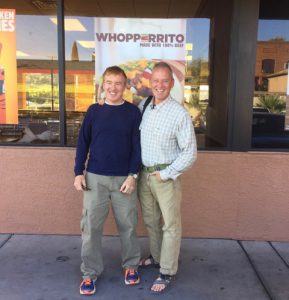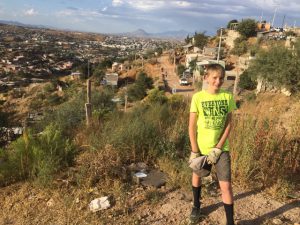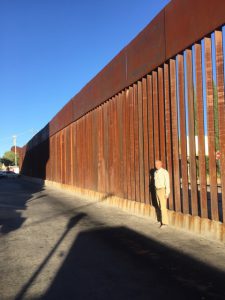“Heal the sick in the town and say, ‘The Kingdom of God has come near to you’.” Jesus in Luke 10.9
For the past seven years, each September, the 8th grade class from Cambridge School in Baltimore has come down to Corhaven to begin their year with three days of camping, community building, teaching, and service. They’re led by their teacher Dr. Scott Buresh (now also a spiritual director with Coracle and our Community Minister in Baltimore), and Rev. Brian Donohue from Lynchburg has come up to teach these young people about the Kingdom of God in terms they can understand. Then each year in October about 6 weeks after coming to Corhaven, these same 8th graders go on a mission trip to one of Brian’s ministries on the US-Mexican borders, along with other adults from various places.

Bill and Rev. Brian Donohue
With his wife Kirsten, Brian founded and runs Cuirium Outreach, a non-profit ministry with three incarnate expressions of Celtic Christianity and community: one on a 6-acre farm in Lynchburg, another in a squatter town in Nogales, Mexico a few miles from the US border south of Tucson, Arizona, and another in a small village in central Ireland. If you know me at all, you can imagine that for the past seven years, each time Brian has come to Corhaven, I’ve been intrigued and curious by this strange combination of a man and ministry leader. Celtic Christianity? Dallas Willard? Retreat farm in rural Virginia? Pilgrimage? Reaching out to the marginalized in developing world contexts? Incarnational Christian community for the sake of the poor? Kingdom of God? Mission?

Liam in Mexico
Since meeting Brian seven years ago I’ve heard of Curium House, the ministry in this Mexican border town, and wanted to see it first hand for that same amount of time. The chance finally came this year when it was possible to go on a short term mission there with my son, Liam, now 13 years old, giving him a chance for his first international missions trip and for he and I to experience it together.
Since purchasing some land in the Colosio neighborhood of Nogales in 2003 for this creative community, outreach, and ministry, what has developed under Brian’s leadership and vision is a beautiful thing to behold. On this little plot of land on hillside, where once was only a kitchen and a bedroom there are now buildings to sleep over 40 people at a time, two chapels, a number of bathrooms, a pantry, toolshed, living room, outdoor eating areas, and places to sit with gorgeous views over the Sonoran hillside. Beyond that, they’ve built a church, facilities for children’s programming and feeding, a space for a drug rehabilitation program, and they’ve done countless improvement projects for many neighbors in the community.
The stories of local lives that have been touched and changed are many and moving, and since starting Curium House in Nogales well over 3,000 people from the US, many of them junior high and high schoolers, have gotten to participate in short term mission projects and, perhaps even more importantly, received from Brian’s excellent teaching on the Kingdom of God. (Frankly, I think Brian is one of the most effective translators of Dallas Willard around, if not the most effective. His teaching on life in the Kingdom of God is deep but simple. remarkably accessible, well illustrated, and deeply rooted in the Bible and the life of Jesus. His book, Kingdom Chronicles is available on Amazon.)
So a day at Curium House is simple, conscientiously approximating a sort of Benedictine rhythm with a Celtic flair. A light breakfast early, morning teaching with prayers and song, then work projects in the community, a big lunch, a rest time, mid-day teaching with prayers and song, more work projects, a light dinner, evening teaching with prayers, fellowship, then bed. It’s good. Solid, simple, ancient, and powerful. Work, study, and prayer. It seems to me the best things now were developed many centuries ago.
Being on the US-Mexico border gives rise to many thoughts and questions. In no particular order, but all related…
- Once again, it’s so powerful to hear the stories of how God can dramatically touch and change the lives of people. One of the Christian leaders here in Nogales was a drug kingpin and trafficker, until Jesus grabbed him, saved him, and changed him. Another Christian leader here was a raging alcoholic, until Jesus grabbed him, saved him, and changed him. Yet another, just seven years ago, was a drug addict sleeping on the streets of Las Vegas, until Jesus grabbed him, saved him, and changed him. Now he helps run the kids programs. Now all of them are Jesus’ hands, feet, and mouth in Nogales and further south in Navojoa, bringing the gospel of Jesus to many and seeing much fruit.
- An 18 foot tall steel fence divides Nogales, Arizona from Nogales, Mexico. Within yards either north or south of that fence the contrast is dramatically stark. Whether or not you were born a mile south of that fence or a mile north will make an immense difference in your life, one that profoundly affects your ability to be all of who God intended you to be based on access to basic necessities needed for human flourishing.
- Who gave permission to the Spanish to take over this part of the world centuries ago, who in turn many years later gave it over to the Americans, who in turn created a border with pen and paper and eventually would build these fences? It was not Americans to begin with, nor was it the Spaniards. But now there is a fence, and which side of it you were born on makes an incalculable impact on your life. I find myself questioning the legitimacy of int ernational borders. (See the footnote “Fire on the Border” below for more on this)
- Nogales, Mexico, heavily made up of squatter towns on the hillsides, is a major location for American and European companies employing cheap labor to manufacture items either for direct sale or as pieces of other made goods that will be assembled somewhere else and sold. (For example, you know those little buttons on airplane armrests that tilt your seat back? Some of them are made here.) There are hundreds of such factories in Nogales. The Mexicans employed in these factories make $9 a day. Something is dramatically wrong about this. Certain aspects of my lifestyle of comfort, safety, and parity is at the direct expense of the lives of thousands of Mexicans here in Nogales, some of whom I sleep next to in this neighborhood of Colosio and whom I pass on the dirt roads.
- Greed is at the bottom of almost all forms of injustice and its various manifestations. You have what I want, so I take it at your expense. It’s what drove the Trans-Atlantic slave trade, it’s what drives American consumerism. The injustices promulgated by the latter are simply much harder to see (because of 18 foot steel fences or thousands of miles of distance), and much more contemporary.
- Once again, having seen and been reminded of reality for so many, I need to reconsider my own lifestyle and reflect who is being harmed so that I can be more comfortable, or have what I want. These are things to converse about with God, and then do something.
- And once again, I am reminded that ‘more stuff’ does not equal contentment, and ‘more security’ does not bring joy. I’ve known it for over two decades now, that we American Christians have more to learn about the deep truths of life with God from developing world Christians than vice versa.
- And once again, I am reminded through the work of God’s people that God’s Kingdom continues to come into the world, often times like a mustard seed that starts small and grows into a place of peace for many, like in a squatter town on a hillside in Nogales.
————————
“Fire on the Border”

Bill at the US/Mexico border
The Kingdom of God comes when the way God designed things to be happens, when the way God wants things to be are. While the Kingdom has come already in true and meaningful ways (Jesus inaugurated its beginning 2000 years ago and it has spread ever since), it is of course not here completely. We await the full coming of the Kingdom when Jesus himself comes again. Until then we point towards the coming of the Kingdom then by doing the work of the Kingdom now as a pointer to the way things were meant to be and will be when the Kingdom fully comes.
There is no hunger in the Kingdom, so we work to alleviate hunger now for the hungry and as a signpost pointing towards the way things will be. There is no thirst in the Kingdom, so we work to bring clean water now for the thirsty as a signpost pointing towards the way things will be. There is no injustice in the Kingdom, so we work for justice now. There is no oppression in the Kingdom, so we work for freedom now. There is no environmental degradation in the Kingdom, so we care for creation now. The list is long. There are so many signposts to plant. The call to followers of Jesus now is the same as it was 2000 years ago to those 72 disciples, whom Jesus sent into the towns of Galilee with this charge, “Heal the sick in the town and say, ‘The Kingdom of God has come near to you’.” (Luke 10.9) When the Kingdom comes, there is nothing that is outside of God’s design for the whole world, then…and now.
When Jesus comes again and the Kingdom fully comes to earth, there will be no international borders. All God’s people will be only one people, only one nation, nothing that is not shared, no need to keep people out, nothing to protect, nothing to grip with a tight and fearful fist. If this profound absence of international borders is the coming reality of the Kingdom of God, what are the signposts that point to it? Surely it means to have generous policies towards immigrants and refugees. Surely it means creative ways for the church to come together across borders to celebrate unity and advocate for dignity, like a cross border mass that happened even as I was writing these words, unbeknownst to me. At that service the Bishop said, ““The government builds these walls but in church there are no walls.”
And I had a vision. Tomorrow morning when we leave Nogales, Mexico and cross through that steel fence to Nogales, Arizona, maybe I should whip my US passport out, set it on fire, hold it up like a torch and sprint past the border guards shouting “The Kingdom of God has come! The Kingdom of God has come!” Surely Jesus did things that upset the religious and political leaders of his day, like healing on the Sabbath or being generous to Samaritans, with that same refrain in either word or essence. “The Kingdom has come!” his life proclaimed. Then as now this turned upside down the systems and the norms and the policies that kept a few in comfort and power at the expense of the many. It got him killed. Going to a US jail on the border would be light punishment in comparison.
But it’s probably not a good idea for this trip. There are likely other, more constructive actions to take to challenge the prevailing norms about America only belonging to those who, through no choice or merit of their own, happened to be born in it.
